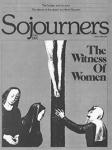Washington, D.C., is actually two cities. Official Washington is the city everyone knows, the capital of the United States of America, a place of monuments, marble, and malls. Stately and cold, the proud architecture of government buildings conveys a clear message: "This is the center of all that is important."
The city's chief characteristic and commodity is power. People here either have it, want it, or need to be close to it. But there is another Washington. It's a city that few know. The people that live here are mostly black and poor. Their neighborhoods are only blocks from the government buildings, but they might as well be a thousand miles away. No monuments here, just substandard housing. Broken glass is far more common than marble. Here kids don't play on grassy malls; they run up and down dirty streets and rat-infested alleys. This city is a center of things, too: things like unemployment, drugs, crime, and despair.
The leading characteristic of this other Washington is powerlessness. Blacks who live in Washington, D.C., have historically served as the domestic help and cheap labor pool for those who run the government.
Colonialism is still the best word to describe the tale of these two cities. The 700,000 residents of the District of Columbia don't even have the right to send voting members to Congress, where the social priorities of the nation are being decided this summer.
Jimmy Carter's administration has proposed a federal budget for fiscal year 1981 in which nearly half of every tax dollar would go for military use. It is the largest military budget in the history of the nation. And in mid-June, the Congress acted to further increase the amount budgeted for defense. Since World War II, the United States has spent $1.8 trillion on the military. Under commitments now being made, we will spend $1 trillion more on the military in the next five years.
Cries for a balanced budget and more military spending often come in the same breath. As always, the money will be taken from social programs which are unpopular and lack the powerful lobbies of the Pentagon and the military contractors to defend them. The nation has decided that the poor will bear the burden of such budget balancing. The Pentagon spends more and wastes more, but social programs are an easy target. Set up more to control poor people than to help them, they are often wasteful and don't work very well. Middle-class taxpayers don't like them. The poor don't like them. People who work with the poor don't like them. No one likes them.
But until we have some real alternatives, poor people are going to suffer when the food stamps dry up in our neighborhood; when teachers, fire fighters, and police are laid off; and when health clinics and daycare centers close their doors. The cost of two Trident submarines equals the total federal expenditures for all elementary and secondary education in one year; fourteen submarines are planned.
From the vantage point of official Washington the overriding issue is staying ahead of the Russians militarily. Ultimately, the arms competition is prompted by the fear that the day might come when the Russians will be able to destroy us 30 times over while we will be able to destroy them only 25 times over. That is now the insane logic of the arms race. Yet it is accepted as political wisdom by politicians, the media, and even the public. The threshold of nuclear overkill was passed so long ago that comparative military calculations are now irrelevant.
The discussion over budget priorities looks very different from the vantage point of the other Washington. People aren't worried about staying ahead of the Russians here. They're worried about surviving the harsh realities of being poor in the United States. They don't perceive their enemies to be in Moscow, but in Washington.
The budget debates of official Washington are more proof to the poor that they don't count in this society. One frustrated Congressman said it all: "Hell, anybody can vote for a cut in legal services for the poor. There's no political problem in voting to kick the hell out of poor people."
Last month, Jimmy Carter told the National Conference of Mayors that national defense must take precedence over urban needs. The next day, a black mayor stood up and told the group to be prepared then for explosions of violence in the cities.
By every major index of urban life, conditions have worsened since the riots of the '60s. We are creating a whole class of desperate people in our cities with no hope, no future, and no stake in this country. Many of them are young, and they are full of rage.
Miami may be only the beginning. Those few nights of outrage and anger offered release even for people in our neighborhood in Washington. But it wasn't enough. Those who were here in the summer of 1968 say the feeling on the street today is much the same as it was then. Living in the middle of such pain and frustration, we find it hard to know what to do.
There is no hope for the poor in Jimmy Carter. Nor in his likely Republican opponent. Nor in Congress. There is no hope for the poor to be found in this cruel system.
The only place the poor can turn is to one another and to the one who has always heard their cries:
Let the lowly hear and be glad:
The Lord listens to their pleas;
And to hearts broken he is near,
For he hears the cry of the poor.
(from Psalm 34)
Jim Wallis was the editor-in-chief of Sojourners when this article appeared.

Got something to say about what you're reading? We value your feedback!
